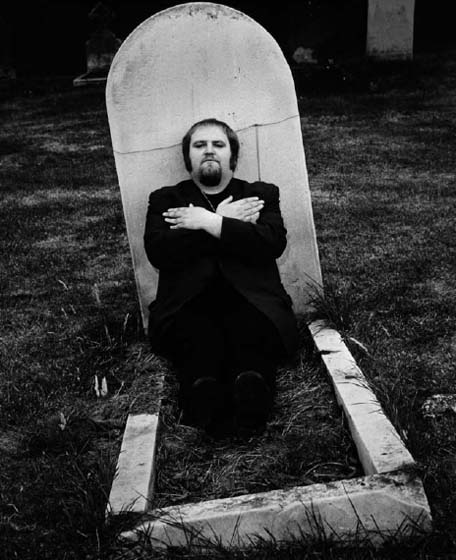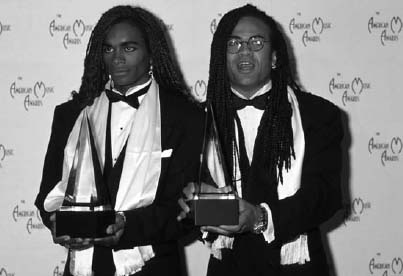The Encyclopedia of Dead Rock Stars (201 page)
Read The Encyclopedia of Dead Rock Stars Online
Authors: Jeremy Simmonds

‘I’ve never been unhappy. It’s not about fame or money - it’s about getting the most out of life.’
Judge Dread, 1997
Judge Dread went the way he might perhaps have chosen – on stage, before his faithful audience of many years. At the end of a performance at Canterbury’s Penny Theatre, Dread (a Kent native), dressed in a Superman T-shirt, turned to salute his band and slumped as he walked offstage. In hospital, the singer was pronounced dead from a massive coronary. According to those present, Dread’s journey there was almost as ‘comic’ as one of his songs: reportedly, the St John’s ambulance broke down and needed to be bump-started; then police pulled the vehicle over for some minutes when locals alleged ‘a bunch of skinheads’ (ie, the singer’s friends) had stolen it.
APRIL
Wednesday1
Rozz Williams
(Roger Alan Painter - Pomona, California, 6 November 1963)
Christian Death
(Various acts)

Satanism, industrial noise, facial white-out, onstage horror – Rozz Williams caught that particular Californian wave way before the likes of Marilyn Manson. Although they didn’t release any material until 1982’s genuinely disquieting
Only Theatre of Pain,
Christian Death – Williams (vox), Rikk Agnew (guitar), James McGearly (bass) and George Belanger (drums) – had existed since Williams, born into a strict Baptist family, was fifteen. The band, originally inspired by British glam acts like T Rex and David Bowie, began with crass stage antics (such as allegedly eating a dead cat), before going on to fashion dark attacks on the organized religion Williams knew all too well. In particular, Williams singled out the corruption he felt inherent in modern Christianity, emphasizing the US Church’s sometimes shady links with politicians. After two further albums, Williams (who was also involved in other projects, like Premature Ejaculation with performance artist Ron Athey) left the band and Christian Death promoted more-theatrical guitarist Valor Kand to the front. From this moment, the group’s output descended from an occasionally well-conceived agenda into badly executed Nazi imagery-by-numbers and self-parody. In 1989, Williams’s rival Christian Death line-up somehow lost out to Kand’s version.
Rozz Williams remained an interesting performer, constantly juggling ideas, but with his increased dependency on heroin and his manic depression, many could foresee only one end for him. This was sadly borne out in April 1998, when Williams was found hanged, by his roommate Ryan Gaumer at their West Hollywood apartment. The singer, who had appeared happier in recent days, left no note.

Judge Dread: Doubtless preparing to get laid in his grave?
Thursday 2
Rob Pilatus
(Munich, 8 June 1965)
Milli Vanilli

Girl, you know it’s fake. One might have thought it couldn’t get much worse for Milli Vanilli – the pop sensation of 1989 exposed as a sham, a ventriloquist act par excellence who suckered the public long enough to see their debut album turn multiplatinum. So how did they manage to let it slip? The simple answer is that by accepting a Grammy award in 1990 Milli Vanilli and the act’s perpetrators became too greedy – having shifted all those records, they just didn’t know when to let it go. Once exposed, their personal humiliation resonated years longer than any of the hits.
But, compared with much that had gone before, Milli Vanilli – Euro dancers Fabrice Morvan and Rob Pilatus – wasn’t
that
bad an idea: two reasonably good-looking guys who could pull one or two moves and appear to mouth a few girl-pleasing platitudes when the moment called. The US lapped them up
– fourteen
million record sales in one year hasn’t been achieved by many. The duo had arrived in style: ‘Girl You Know It’s True’, ‘Baby Don’t Forget My Number’, ‘Girl I’m Gonna Miss You’ and ‘Blame It On the Rain’ (all 1989, all million-selling singles) gave them the best US starting run since The Beatles – except that it wasn’t Morvan and Pilatus singing on the records but session men Charles Shaw, John Davis and Brad Howe. On reflection, it’s odd that so much fuss was made once the truth was out. The supremo behind Milli Vanilli was Frank Farian, who had duped some 10 million Britons into believing that Boney M (or most of them, at least) were responsible for
their
own output ten years earlier. So Milli had to return their Grammy. Then, in one of the most cringingly awful moments in pop history, the pair attempted to prove in a press conference that they
could
sing – which gave the world the unique scenario of photographers clamouring to escape.
‘The only disgrace is how Rob died, all alone. Where were the ones that pushed us to the top, who made the millions?’
Fabrice Morvan (who maintains Pilatus’s death was unintentional), 1998

Morvan and Pilatus of Milli Vanilli: The trophies were replicas, too
In the aftermath, the always slightly wayward Rob Pilatus fell apart. Morvan had something of a voice after all, it seemed, and a solo career looked likely for him – but former model Pilatus now had nothing but a growing cocaine problem and a lorry-load of debts. Still living in Los Angeles, he’d threatened suicide as early as 1990, falling into petty crime by the middle of the decade to support his habit (Farian apparently then bailed him out of jail). Just weeks before his death, Pilatus was interviewed in rehab by a German television channel and shocked viewers with both his appearance and the bald statement that he wished to die.
Then, on the morning of 3 April, the inevitable happened. Pilatus’s body was discovered in a hotel room; he had overdosed on alcohol and prescription medication. For Rob Pilatus, the sad story was finally over. Even in death, he received little respect – jokes along the lines of ‘was it him in the casket?’ abounded. But it was a genuine tragedy, for in pop music there have been far worse ‘crimes’ than the naked ambition of a regular young guy offered the chance of a lifetime. The continued greed and opportunism of faceless executives who can always hide behind something – or someone – else when caught out might just be one.
Sunday 5
Cozy Powell
(Colin Flooks - Cirencester, 29 December 1949)
Rainbow
The Jeff Beck Group
Cozy Powell’s Hammer
Black Sabbath
(Various acts)

In the house of British hard rock, Cozy Powell represents the mortar that holds the whole structure together, so regularly do his contributions seem to recur. Quite apart from the above list of name acts for whom he manned the traps, Powell can also claim to have drummed with stadium shakers like Roger Daltrey, Gary Moore, Robert Plant, ELP, The Michael Schenker Group and Whitesnake – and his own act, Bedlam. Powell, a technical musician, began as a journeyman with The Sorcerers in the late sixties, until Jeff Beck called upon his services for a pair of albums in 1972. Working sessions with Mickie Most at RAK proved pivotal, the industry guru suggesting Powell cut some records of his own. The first was the hypnotic ‘Dance with the Devil’ (1973), a record completely of its time that sold almost half a million copies in Britain. Other hits followed, such as 1974 football chant ‘Na Na Na’, but within another year the drummer was conscripted by Ritchie Blackmore for his post-Deep Purple project, Rainbow – Powell remained with them for five albums. Although his subsequent career was more fragmented, Powell had now accured some considerable wealth – much of which he invested in his greatest love, fast cars. So great was his obsession that, in the eighties, the drummer had briefly planned to quit music for motor racing.
By 1998 the percussionist shared the grounds of his Bristol home with a fine collection of automobiles and motorbikes – one of which he crashed, break-ing his ribs and injuring his foot. Even as he recovered from this, the insatiable Powell was involved in another crash in his Saab 9000: while speaking to his girlfriend, Sharon Reeve, on a mobile phone (before such activities were outlawed), the drummer suffered a high-speed blowout and collided with a guard rail on the M4. Rushed to hospital, he was pronounced dead on arrival. It seems Powell was not only driving at 104 mph but was also found to be over the limit and not wearing a seat belt. It is thought that Cozy Powell – who had yet another new project on the way at the time of his death – contributed to at least sixty-five rock albums during his career.